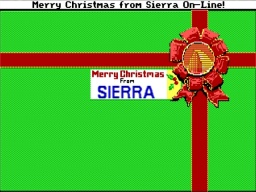Difference between revisions of "Christmas Card 1988"
(Adds data file info) |
|||
| (2 intermediate revisions by one other user not shown) | |||
| Line 11: | Line 11: | ||
resolution=320x200, 16 colors| | resolution=320x200, 16 colors| | ||
support=Since ScummVM 1.2.0| | support=Since ScummVM 1.2.0| | ||
purchase=Available from our [http://www.scummvm.org/demos demos] page | purchase=Available from our<br />[http://www.scummvm.org/demos demos] page | ||
}} | }} | ||
'''Christmas Card 1988''' is the name to which Sierra's second Christmas Card program is most commonly referred. Like [[Christmas Card 1986]], Sierra's Christmas Card 1988 was distributed to stores by Sierra and was intended to showcase the color and sound capabilities of the computer for sale, and to showcase Sierra's game engine. This time around, the engine showcased was the more powerful SCI engine. | '''Christmas Card 1988''' is the name to which Sierra's second Christmas Card program is most commonly referred. Like [[Christmas Card 1986]], Sierra's Christmas Card 1988 was distributed to stores by Sierra and was intended to showcase the color and sound capabilities of the computer for sale, and to showcase Sierra's game engine. This time around, the engine showcased was the more powerful SCI engine. | ||
==Installation== | |||
===Required data files === | |||
For more information on how ScummVM uses game data files, see the [https://docs.scummvm.org/en/latest/use_scummvm/game_files.html user documentation]. | |||
WARNING: Unlike other games, SCI games have significant variation in the naming of required files. | |||
They also can load supplementary files by resource maps, so it is recommended to keep all files in the game data directory from the CD. | |||
Unless otherwise specified, do '''NOT''' remove any file from the directory, even if it does not appear on the following list, since this will likely cause weird bugs. | |||
Copy all files to the game directory. Some games need additional work: | |||
'''''Floppy games with RESOURCE.p01, p02, etc. and/or RESOURCE.a01, a02, etc. files''''' | |||
* Concatenate all RESOURCE.p0* files to RESOURCE.000 (e.g. <code>copy /b RESOURCE.p0* RESOURCE.000</code> on Windows, or <code>cat RESOURCE.p0* > RESOURCE.000</code> on *nix). | |||
* Concatenate all RESOURCE.a0* files to RESOURCE.AUD (e.g. <code>copy /b RESOURCE.a0* RESOURCE.AUD</code> on Windows, or <code>cat RESOURCE.a0* > RESOURCE.AUD</code> on *nix). | |||
[[Category:SCI Games]] | [[Category:SCI Games]] | ||
[[Category:Supported Games]] | |||
Latest revision as of 00:05, 16 February 2021
| Christmas Card 1988 | ||
|---|---|---|

| ||
| First release | 1988 | |
| Also known as | Xmas Card 1988, Merry Christmas From Sierra | |
| Developed by | Sierra | |
| Published by | Sierra | |
| Distributed by | Sierra | |
| Platforms | MS-DOS | |
| Resolution | 320x200, 16 colors | |
| Engine | SCI | |
| Support | Since ScummVM 1.2.0 | |
| Available for Purchase |
Available from our demos page | |
Christmas Card 1988 is the name to which Sierra's second Christmas Card program is most commonly referred. Like Christmas Card 1986, Sierra's Christmas Card 1988 was distributed to stores by Sierra and was intended to showcase the color and sound capabilities of the computer for sale, and to showcase Sierra's game engine. This time around, the engine showcased was the more powerful SCI engine.
Installation
Required data files
For more information on how ScummVM uses game data files, see the user documentation.
WARNING: Unlike other games, SCI games have significant variation in the naming of required files.
They also can load supplementary files by resource maps, so it is recommended to keep all files in the game data directory from the CD.
Unless otherwise specified, do NOT remove any file from the directory, even if it does not appear on the following list, since this will likely cause weird bugs.
Copy all files to the game directory. Some games need additional work:
Floppy games with RESOURCE.p01, p02, etc. and/or RESOURCE.a01, a02, etc. files
- Concatenate all RESOURCE.p0* files to RESOURCE.000 (e.g.
copy /b RESOURCE.p0* RESOURCE.000on Windows, orcat RESOURCE.p0* > RESOURCE.000on *nix). - Concatenate all RESOURCE.a0* files to RESOURCE.AUD (e.g.
copy /b RESOURCE.a0* RESOURCE.AUDon Windows, orcat RESOURCE.a0* > RESOURCE.AUDon *nix).